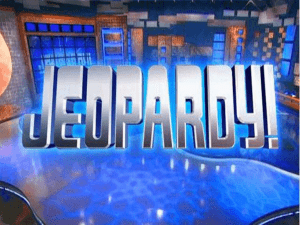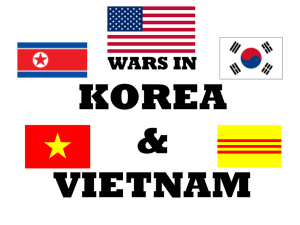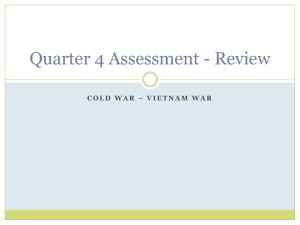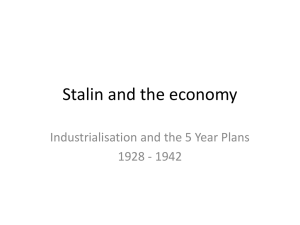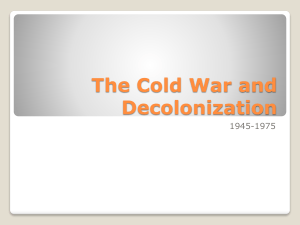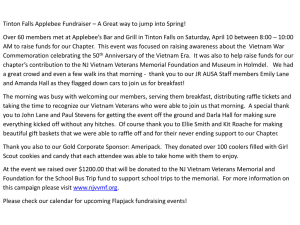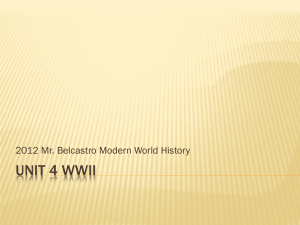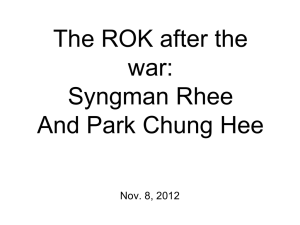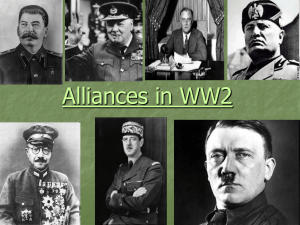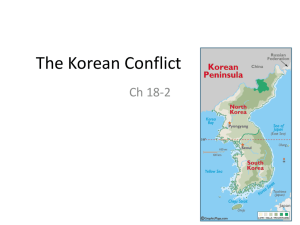Cold War Hot Wars
advertisement
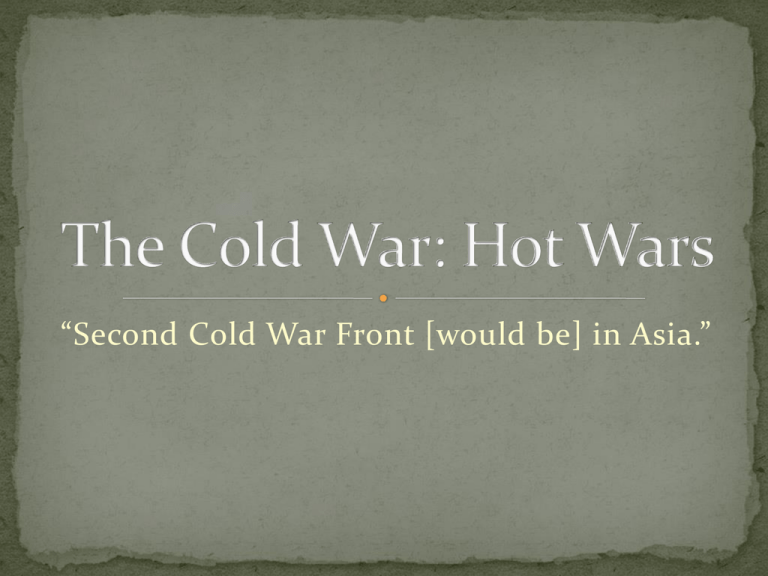
“Second Cold War Front [would be] in Asia.” What is a Hot War? How is it different from a “Cold War?” Why are Hot Wars important to remember in the Cold War Unit? Background: Girl and Boy fall madly in love. They are separated, Girl thinks the Boy is dead. Girl is betrothed to a Prince, and she is captured in order to cause a war between the Prince’s nation and a neighboring nation… Her capture is fighting a mind game with a Masked Man…. Speaking of Wars…. Where wouldn’t you want to fight a war? Anywhere particularly in the World? Certain terrains? Locals? Listen VERY closely to the little man. What does he say that connects to the Cold War??? Annexed by Japan 1910 USSR invaded Manchuria, going straight into Korea (beginning August 1945) After WWII, it was decided that the 38th Parallel (an arbitrary point) would divide North (USSR) from South (US)…. First American soldiers: 1945, September Japanese were used to help govern Korea—not Koreans Economic chaos and hardship Inflation Poverty Civil Disturbances! Ultimate Goal: Re-unification of N & S As time continued, it was moved farther from possible, yet there was still a continued expressed desire to reunite Middle class, US Doctorate Appealed to US; Koreans gave little support Positives (US POV): Anti-Communist Perfect English Not present during Japanese Occupation Became Corrupt and Ruthless No interest in popular democracy No interest in personal freedoms Yet, was still considered the best option that the US had to rule in South Korea…. Feb 1947 – People’s Assembly of North Korea Kim II Sung: Elected chairman Strongly opposed Japanese occupation 1945 lead Korean Unit in Red Army Land reform (tenant farmers given own land) Viciously put down all Anti-Communist opposition UN demanded elections take place USSR refused South participated Communists in south boycotted Repression of Communists ((Were the results true??)) 1949, Aug – Rhee becomes President “major excursions” across 38th Tensions increase N= Propaganda predicted invasion S= Communist arrested and imprisoned By June 1949, both Soviet and US forces had withdrawn from Korea Wanted to invade South Stalin would not back him Honoring WWII treaties Stalin consented when: Detonated first USSR A-bomb ( Aug 1949) Communism Takes over China Thought US would be hesitant to enter a war so far away, even with the threat of the spread of communism Stalin pledged military and technical assistance BUT dictated day of Invasion (June 25th, 1950) WHY? To pull out Soviet Advisors WHY?!?!? North invaded on pretext of Southern launching an “armed” incursion Was a total Surprise Rhee outnumbered and outmatched Within hours, South was retreating US State Department agreed that this aggressive action would not be tolerated Condemned Invasion 38th Parallel withdrawal June 27th- Military assistance from UN members Truman – “Police action” Ultimately: UN providing Multinational support for Rhee’s weak and corrupt gov’t USSR in UN?? Previous predictions ((fears?)) of Soviet aggression were coming true! Seen as Soviet Plot to overthrow Asian democracies ((Communist Conspiracy?!)) Reality: Stalin was complying with an over ambitious ally and utilizing a perceived weakness in US War Hero Previously declared that Asia would be where Democracy would fight against the spread of Communism South: Weak military and Gov’t Army fled, like civilians did S army blew up bridges—killing civilians– to prevent the N from following While pursuing, N executed Rhee sympathizers Not Prepared, No Battle Plan Flown in from Japan First US-Communist Confrontation resulted in a miserable US defeat, time and time again. Missing anti-tank artillery US winning only in the skies Truman: “Aggression must be met firmly” July 7th> MacArthur is titled “Supreme Commander of the UN Force” Expanded Presidential Powers Expanded Draft Recalled previous duty soldiers (WWII) Increases Military Expenditures by 5 times They quickly become over extended Moved too quickly to form stable and secure supply lines US “dug in” at Pusan, creating the Pusan Perimeter “Complete mobilization of the Korean People” Meaning? Without training Civilian Men rounded up Thrown to front lines MacArthur formulates and launches a beach attack 150 miles behind enemy lines “it will not fail” Capital recaptured (Sep 25th) 50,00 civilians died Move North/ Northeast, to recapture South Korea North Army beginning to dissolve Withdraws military advisors Tells Kim to start planning for evacuation UN forces reach the 38th Parallel Invade North? Or be happy to have South? MacArthur & Rhee They hadn’t gone this far to stop where the tensions began Re-unification and Re-habilitation of Korea Stalin was more disappointed with Kim, and completely withdraws aid China (who was also frustrated with Kim) was told to aid Korea Advised Korea to use guerilla tactics to fight Dropped international hints to their intentions of aiding Korea China hints that any farther and they would use troops US believed it was a bluff Mid-October- Chinese Army volunters fighting with Koreans and meet UN and US troops MacArthur pushes troops northward… Upon getting closer to the boarder, China attacked. Despite heavy casualties, China won. Full-scale war with China?!?! China pressed southward, recapturing North’s capital Seoul (capital S) falls into Chinese control again (Jan 4th, 1951) February – UN troops reinvigorated March – Seoul recaptured MacArthur advocates Chinese invasion He is shortly replaced Why: US regarded Korea as limited operation and didn’t want to start a direct confrontation with Soviet Union April 1951 – Stalemate was reached, at the 38th Armistice talks began July 1951, but flounder after 6 weeks of no agreements Troops have dug in, fighting resumes Like trench warfare from WWI, with modern technology MiG-15 Soviet fighters used, even flown by Russians Americans ignored this, fearing open fight with Russia 600,000 tons of bombs dropped Industry moves underground Workers encouraged to increase production Nationalism, proud of standing up to US Despite continuous requests for military aid, Stalin reuses a majority Fear of causing war with US China was given hardware, but had to pay for it Armistice talks begin October 1951 Lasts 18 months Atrocities on POWs Dwight D. Eisenhower elected 1952 Stalin dies March 1953 New leadership decided in 2 weeks that Korea had to end Mao (China) decided the same… Increased fighting June 1953 Eisenhower Bombs dams, threatens Nuclear bombs against China Rhee opens POW gates (South) Churchill cables US saying Rhee needs to leave office US: 54,000 dead, 100,000 injured UN forces: 3,000 dead, 12,000 injured North: 1 million deaths Chinese: 112,000 (maybe double?) 5 million homeless civilians in South Major cities flattened Japan’s economy boomed during; S Korea’s boomed a generation later Mid-1800s – French occupation Began May 1954 – France could no longer hold out against Vietnamese nationalists After WWII defeat, returned to Indochina to retain colonial powers Leader of the League for the Independence of Vietnam (Viet Minh) Dedicated North Vietnamese Communist Declared Vietnam’s independence after Japan’s surrender (WWII) USSR and China supplied heavy weapons and ammunition Indochina labeled as being declared devoid of decisive military objectives Eisenhower: “row of dominoes” “The possible consequences of the loss are just incalculable to the free world.” Included: Laos, Cambodia, Burma, Thailand, India Communist Conspiracy Strengthening of the Communist bloc Ho Chi Minh Land reform, education, health care Broadened popular support More extreme Communist take over: Private land confiscated Pilloried, labor camps, or executed A million refugees flee Communist North for the South Ngo Dinh Diem took over: Republic of Vietnam Catholic, Confucian, Anti-communist Religiously intolerant He ruled like an Emperor Arrest detains opponents (mainly Communists sympathizers) Within a few years Viet Minh were eliminated from South Vietnam Ignored and abolished elections (1956) He would appoint officials He was fearful of communists winning the elections US funded his gov’t…. As our commitment intensified to keep Communism contained, our aid increased Yet, he listened to family more so than the US December 1960 National Front for the Liberation of South Vietnam National Liberation Front Wanted to overthrown Diem Eisenhower to Kennedy “pay any price” “Bear any burden” Sent in military advisors To train S Vietnamese in counterinsurgency 1961 3000 military professionals 1962 – Undeclared war, 11,500 personnel Diem came under scrutiny Religious intolerance (raiding, destroying Buddhist Shrines, pagodas, arresting monks etc) Monks –Self-immolation Burning themselves to death A cable was sent, telling military personnel to look for new leader of Vietnam, should it be necessary to replace Diem. It was interpreted as an order for a coup… The CIA was involved “We are launched on a course from which there is no respectable turning back.” Nov 1963 – Diem agreed to step down, when S Vietnamese rebel generals surrounded the presidential palace, and taking over facilities Diem and second in command (brother) fled, but were captured. They were murdered, once picked up en route to the rebel military headquarters… Convinced of Soviet and Chinese involvement in Vietnam Give priority to Vietnam over social concerns… August 1964, in the Gulf of Tonkin US ships conducting surveillance the area Claimed it was international waters?? These ships came under fire 2 days later there was reports of more attacks Although these were false Johnson seized the chance Claiming unprovoked aggression Launched attack at Northern bases President can use “all necessary measures,” defending American or allied troops, and to “prevent further aggression.” President decides when “peace and security” has been met… Resolution “covered everything” Johnson could approach and take care of Vietnam in any manner he saw fit to Passed 88-2 (senate), 416-0 (HoR) Chinese saw themselves as defending countries against imperialism, desiring to help N Vietnam through aid Russians wanted a peaceful coexistence with the US, and tried to persuade Minh to initiate peace talks with the US. Despite not following their persuasion, Minh was still given Soviet aid 1965 – roughly 170,000 men and women. Full Metal Jacket: “ Half of these… [prostitutes] are serving officers in the Viet Cong…” Could at attack at any time Attacked US bases Used car bombs 8 died, 100+ wounded These guerrilla tactics prompt Johnson to begin bombing North Vietnam For eight years It did not succeed to getting the N Vietnamese to start peace talks Napalm, high explosives and other bombs were not seen as effective means for fighting against an undeveloped country. Yet, to ease up these attacks would make the US possibly appear weak in the international community and to the Viet Cong 18 million gallons of herbicides dumped on Vietnam Agent Orange (defoliant) Cancer causing US had dropped more tons of explosives on Vietnam than all that were dropped in WWII 1965, March 8th 3500 Marines In full battle gear Seek and kill You will need more and more men to complete an unrealistic, unattainable goal…. Johnson: it was a black and white issue: either full- scale war or humiliating retreat By the end of 1965 – 183,000 troops US brings technology to the undeveloped country Creates roadways, bridges, new radio and communication towers, airfields, floating piers Forced from the Agent Orange, Napalm and other bombings, peasants flee to the cities, and build “towns” (shanties) on the outskirts… This decimates their traditional culture/lifestyle, destroying families (through forcing them to abandon their farms) An “Underworld” appeared around the soldiers, providing them with prostitutes, massage parlors, nightclubs Nightly TV Destruction and carnage TV networks, rather than military reporters ((Would this change public opinion against or for the war effort?)) Attempted to befriend Villages, looking for Viet Cong and Communists Pacification Policy of “Shoot first ask questions later” ((Why would you want the peasants supporting your side of the war effort?)) ((How can you tell who is and who is not a Viet Cong?)) 1961 Cuban Exiles “secretly” assisted by the CIA Invade Cuba (through Bay of Pigs) Exiles landed, US was supposed to provide air support, but we pulled out, leaving the exiles to be recaptured Was supposed to cause a popular uprising amongst the people (didn’t) Supposed to have air support (didn’t) People versus tanks… Of the 1500 exiles, 14 rescued by the US, 100+ were dead. The rest surrendered US has bases in Turkey with missiles that can hit targets within the USSR…. Yet, the USSR did not have a site like this…. Until Cuba After negotiations with Cuba, USSR sent Soviet ships with the missiles , July 1962 October 14th, 1962, a U-2 Spy plane photographs the missiles Cuba 90 miles from US Within a 1100 range, Washington and 40% of the Strategic Air Command would be vulnerable. Within 2200, Most cities, except Seattle could be targeted, wiping out all Strategic Air Command bases Missiles had 1 mill tons of TNT power (Hiroshima was only 13000) Kennedy originally backing a strategic and precise air attack He decided to follow a naval blockade Less aggressive than an attack Yet, keeping the Soviets away from Cuba Called it a “Quarantine” Khrushchev: “If the US insists on war, we’ll all meet together in hell.” He tells the US that the blockade is illegal and Russian submarines will sink American ships The first ships to meet: Russian ship promises that it only has oil, and the US ship allows it through “I don’t want to push him [ Khrushchev] in a corner from which he cannot escape.” ((What won’t the blockade do?)) Amidst talks (initiated by a KGB operative, through his own initiative), quid pro quo is raised If Russia takes down the Cuban missiles, US has to take down Turkey missiles They agree to take down the Cuban missiles, providing the US does not invade Cuba, and that the US gradually take out the Turkey missiles
